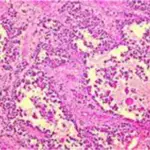Embryonal rhabdomyosarcoma is a rare histological form of cancer of connective tissue wherein the mesenchymal-derived malignant cells resemble the primitive developing skeletal muscle of the embryo.
What is the Pathology of Embryonal Rhabdomyosarcoma?
The pathology of embryonal rhabdomyosarcoma is:
-Etiology: The cause of embryonal rhabdomyosarcoma is sporadic with no genetic predisposition.
-Genes involved: RAS family of oncogenes.
-Pathogenesis: The sequence of events that lead to embryonal rhabdomyosarcoma are translocations resulting in altered expression, function, and subcellular localization of the fusion products relative to the wild-type proteins, and ultimately contributing to oncogenic behavior by modifying growth, differentiation, and apoptosis pathways.
-Histology: The histology associated with embryonal rhabdomyosarcoma shows primitive mesenchymal cells that show variable degrees of skeletal muscle differentiation.
How does Embryonal Rhabdomyosarcoma Present?
Patients with embryonal rhabdomyosarcoma typically affect both males and females present at the age range of 0-4 years. The symptoms, features, and clinical findings associated with embryonal rhabdomyosarcoma shows lump or swelling that keeps getting bigger or does not go away, it may be painful, crossed eyes or bulging of the eye, headache, trouble urinating or having bowel movements, blood in the urine, bleeding in the nose, throat, vagina, or rectum.
How is Embryonal Rhabdomyosarcoma Diagnosed?
Embryonal rhabdomyosarcoma is diagnosed by X-rays, MRI, PET scan, CT scan, and biopsy.
How is Embryonal Rhabdomyosarcoma Treated?
Embryonal rhabdomyosarcoma is treated with surgery.
What is the Prognosis of Embryonal Rhabdomyosarcoma?
The prognosis of embryonal rhabdomyosarcoma is good with over 70% of patients surviving for five years after diagnosis.



